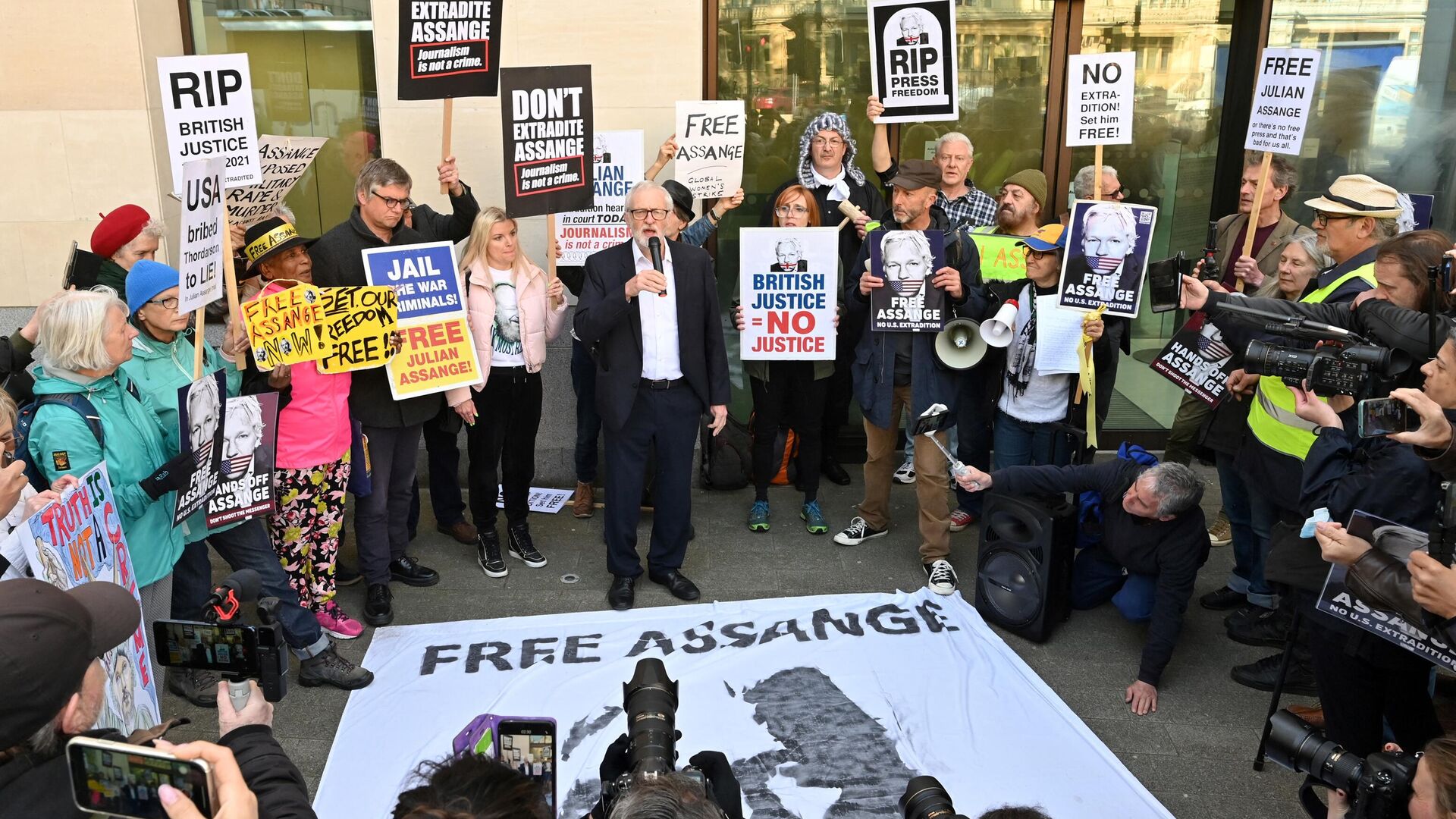https://sputnikglobe.com/20220420/westminster-magistrates-court-issues-order-on-julian-assange-extradition-to-us-1094907602.html
Westminster Magistrates' Court Issues Order to Extradite Julian Assange to US
Westminster Magistrates' Court Issues Order to Extradite Julian Assange to US
Sputnik International
Lawyers for Julian Assange argued that the WikiLeaks founder had not yet exhausted his options to challenge the decision to extradite him, pointing out that... 20.04.2022, Sputnik International
2022-04-20T09:59+0000
2022-04-20T09:59+0000
2023-05-28T15:19+0000
us
julian assange
extradition
united kingdom (uk)
https://cdn1.img.sputnikglobe.com/img/07e6/04/14/1094908490_0:151:3105:1898_1920x0_80_0_0_0b0676492a0af28c1dbd36ca0b1967d5.jpg
The London court made a formal decision to extradite Julian Assange to the United States on Wednesday.However, the final decision is to be made by the UK government.The order was issued at a brief hearing at Westminster Magistrates' Court, with Assange forced to watch via video link from Belmarsh prison. During the hearing, his supporters rallied outside the court building, demanding freedom for the WikiLeaks founder.WikiLeaks tweeted that the defence team has until 18 May to challenge the decision and make representations to Home Secretary Priti Patel before makes her decision on the ruling.Should he be extradited to the United States, where he is accused of espionage, Assange faces up to 175 years behind bars.WikiLeaks' chief editor Kristinn Hrafnsson said that by issuing the extradition order, the Westminster Magistrate's Court had signed Assange's death sentence. Earlier, Assange's defence team argued that the WikiLeaks founder might commit suicide if he was extradited to the US.The decision of the London court was condemned by the Russian Foreign Ministry, with Moscow calling the ruling to extradite Assange "shameful" and a "farce".Assange has been held on remand at the Belmarsh maximum-security prison in southeast London since October 2020, after serving an 11-month sentence for breaking bail conditions. His bail required that he appear in court in 2012, but he opted to seek asylum at the Ecuadorian embassy in London, where he remained until 2019, on the grounds that that he could extradited to the US.In December 2021, the London High Court greenlit the US appeal to extradite Assange, overturning an earlier ruling that the journalist could not be extradited to the US due to his health issues and inhumane conditions that await him in an American prison.Washington sought Assange's extradition to the US over accusations of espionage after WikiLeaks published thousands of classified documents revealing war crimes committed by US troops in Iraq and Afghanistan.The persecution of Assange has been condemned by journalists and human rights activists across the world, who have slammed US and British authorities for attacking press freedom by going after the WikiLeaks founder.
united kingdom (uk)
Sputnik International
feedback@sputniknews.com
+74956456601
MIA „Rossiya Segodnya“
2022
Sputnik International
feedback@sputniknews.com
+74956456601
MIA „Rossiya Segodnya“
News
en_EN
Sputnik International
feedback@sputniknews.com
+74956456601
MIA „Rossiya Segodnya“
Sputnik International
feedback@sputniknews.com
+74956456601
MIA „Rossiya Segodnya“
us, julian assange, extradition, united kingdom (uk)
us, julian assange, extradition, united kingdom (uk)
Westminster Magistrates' Court Issues Order to Extradite Julian Assange to US
09:59 GMT 20.04.2022 (Updated: 15:19 GMT 28.05.2023) Lawyers for Julian Assange argued that the WikiLeaks founder had not yet exhausted his options to challenge the decision to extradite him, pointing out that "the troubling circumstances in which requesting states can provide caveated guarantees after the conclusion of a full evidential hearing" were not taken into consideration.
The London court made a formal decision to extradite Julian Assange to the United States on Wednesday.
However, the final decision is to be made by the UK government.
The order was issued at a brief hearing at Westminster Magistrates' Court, with Assange forced to watch via video link from Belmarsh prison. During the hearing, his supporters rallied outside the court building, demanding freedom for the WikiLeaks founder.
WikiLeaks tweeted that the defence team has until 18 May to challenge the decision and make representations to Home Secretary Priti Patel before makes her decision on the ruling.
Should he be extradited to the United States, where he is accused of espionage, Assange faces up to 175 years behind bars.
WikiLeaks' chief editor Kristinn Hrafnsson said that by issuing the extradition order, the Westminster Magistrate's Court had signed Assange's death sentence.
"Extraditing Assange would be a risk to his life," Hrafnsson told the crowd assembled in front of the court. "It would be equal to a death sentence. Now, Julian's life is in the hands of Priti Patel and Boris Johnson. They need to do the right thing."
Earlier, Assange's defence team argued that the WikiLeaks founder might commit suicide if he was extradited to the US.
The decision of the London court was condemned by the Russian Foreign Ministry, with Moscow calling the ruling to extradite Assange "shameful" and a "farce".
Assange has been held on remand at the Belmarsh maximum-security prison in southeast London since October 2020, after serving an 11-month sentence for breaking bail conditions. His bail required that he appear in court in 2012, but he opted to seek asylum at the Ecuadorian embassy in London, where he remained until 2019, on the grounds that that he could extradited to the US.
In December 2021, the London High Court greenlit the US appeal to extradite Assange, overturning an earlier ruling that the
journalist could not be extradited to the US due to his health issues and inhumane conditions that await him in an American prison.
Washington sought Assange's extradition to the US over accusations of espionage after WikiLeaks published thousands of classified documents revealing war crimes committed by US troops in Iraq and Afghanistan.
The persecution of Assange has been condemned by journalists and human rights activists across the world, who have slammed US and British authorities for attacking press freedom by going after the WikiLeaks founder.

